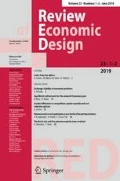Abstract
We study a problem in which a group of voters must decide which candidates are elected from a set of alternatives. The voters’ preferences on the combinations of elected candidates are represented by linear orderings. We propose a family of restrictions of the domain of separable preferences. These subdomains are generated from a partition that identifies the friends, enemies and unbiased candidates for each voter. We characterize the family of social choice functions that satisfy strategy-proofness and tops-onlyness properties on each of the subdomains. We find that these domain restrictions are not accompanied by an increase in the family of social choice functions satisfying the two properties.
Similar content being viewed by others
Notes
In a different context, Barberà et al. (2001) use the idea of friendship and enmity (without the possibility of being unbiased) in a dynamic model in which the current members of a club must choose which candidates are accepted for entry.
Given a set \(A\), we denote by \(2^A\) the set of all possible subsets of \(A\), including the empty set \(\phi \).
The reader is referred to Barberà (2011) for an extensive review of the literature.
We occasionally abuse the notation and write simply \(x\) instead of \(\{x\}\) when \(x\) is not \(\phi \). However, we always distinguish between \(\{\phi \}\) and \(\phi \) because they have different meanings, the first one is an element of \(2^A\) while the second one is not.
Obviously, we assume here that \(n\) is even.
Sakai (2012) develops a more structured framework to analyze NIMBY problems from an axiomatic point of view.
The sets \(C_x=\phi \) and \(C'_x=\{\phi \}\) have different interpretation. The first one has no elements, while the second one contains an element (the empty set). Thus, \(C_x\) vacuously satisfies the monotonicity condition to be a committee, but \(C'_x\) does not.
Penn et al. (2011) consider environments in which individuals may provide a preference in the universal domain and show that in these environments, any SCF that is coalitionally strategy-proof must be dictatorial.
Extended strategy-proofness. For each \(i\in N\), each \(R_{N}\in \mathcal U _{N}\), and each \(R_{i}^{\prime }\in \mathcal{D }^{V_{i}}, S(R_{i}^{\prime },R_{-i})\,R_{i}^{\prime }\,S(R_{i},R_{-i})\).
References
Barberà S, Sonnenschein H, Zhou L (1991) Voting by committees. Econometrica 59:595–609
Barberà S, Maschler M, Shalev J (2001) Voting for voters: a model of electoral evolution. Games Econ Behav 37:40–78
Barberà S (2011) Strategy-proof social choice. In: Arrow KJ, Sen AK, Suzumura K (eds) Handbook of social choice and welfare, vol 2. North-Holland, Amsterdam, pp 731–831
Border K, Jordan JS (1983) Straightforward elections, unanimity and phantom voters. Rev Econ Stud 50:153–170
Esteban J, Ray D (1994) On the measurement of polarization. Econometrica 62:819–851
Gibbard A (1973) Manipulation of voting scheme: a general result. Econometrica 10:587–601
Moulin H (1980) On strategy-proofness and single-peakedness. Publ Choice 35:437–455
Penn E, Patty J, Gailmard S (2011) Manipulation and single-peakedness: a general result. Am J Polit Sci 55:436–449
Sakai T (2012) Fair waste pricing: an axiomatic analysis to the NIMBY problem. Econ Theory 50:499–521
Satterthwaite MA (1975) Strategy-proofness and arrow’s conditions: existence and correspondence theorems for voting procedures and social welfare functions. J Econ Theory 10:187–217
Author information
Authors and Affiliations
Corresponding author
Additional information
We gratefully acknowledge financial support from Junta de Andalucía through grants SEJ-4941 and SEJ-5980 and Ministerio de Ciencia through grant ECO2011-29355.
Rights and permissions
About this article
Cite this article
Martínez, R., Moreno, B. Strategy-proofness on restricted separable domains. Rev Econ Design 17, 323–333 (2013). https://doi.org/10.1007/s10058-013-0149-7
Received:
Accepted:
Published:
Issue Date:
DOI: https://doi.org/10.1007/s10058-013-0149-7



